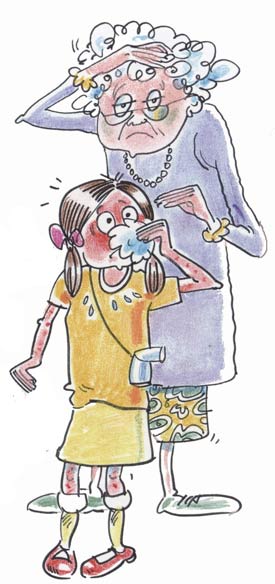|
|
Staying ahead with pollen |
Nathalie Newman tells us how she manages for herself and her multi allergic son Callum. |
Callum and I both suffer with hayfever. He tends to be the grass pollens and weeds, while I have the pleasure of the trees kicking things off from as early as late January/early February.
I’d love to be able to say there’s a definitive way of preventing these symptoms, but sadly there isn’t. What works for one might not work for another. But there are a number of different things you can do to help reduce their impact! Antihistamines – yes, they do work... Firstly, get to know your symptoms. Understand when you start to be affected by pollen so you can pre-empt them. You can do this by taking antihistamine a month before the season starts. This will mean that you have a good protection before the pollen starts to become a problem for you. So for example, with grass pollen start taking medication in April so that you can prevent symptoms early on. Remember to always take your medication each day. Make sure that you are consistent with whatever form of medication you’re taking, whether it’s nose spray, daily antihistamine, inhalers etc. If you miss any day of taking them, it will mean that they won’t be as effective and will result in you being more symptomatic. Drying your washing... One of my key tips is to make sure that you don’t dry your washing outside because, when the pollen settles, it will stick to the washing. Now imagine that pollen on your clothes, or on your bed sheets. It will cause you a lot of discomfort, and will probably make you feel really itchy. I started to dry my washing inside a few years ago now, and the difference for me was incredible! Being out and about And don’t forget that this will also happen to you as you’re out and about. Pollen will stick to you as you go about your daily business. So, on days when the pollen is particularly high, change your clothes as soon as you get home – being careful not to shake the pollen everywhere and putting the clothes straight in the wash. At the end of the day, shower before you go to bed to help remove any pollen build up that will be on your skin and especially hair! This should help to reduce any symptoms you may be suffering from at night! Your pets and pollen And don’t forget, if you have pets, they will be carrying pollen on their fur too as the pollen will settle on them just like it does on us! I used to get laughed at for wiping our cat down lightly with a baby wipe when she came in from outside. That was until I showed how much pollen it picked up off her on a particularly high pollen count day. By baby wiping when they come into the house, it will not only help to remove the pollen from their fur, but it also helps to prevent the pollen from being traipsed through the house. Close those windows... When it’s a hot summers day, it’s lovely to have the windows and doors open to let a breeze in. But, it will also be allowing the pollen to enter the house. Where possible, try to keep the windows and doors closed, at least at times when the pollen levels will be higher, such as in the evening as it starts to settle. And wear those shades! On this same thought process, wear sunglasses when out and about as it will help to protect your eyes from the pollen; they will act as a barrier. This should help to reduce the itchy sore eyes that are associated with hayfever. Watch the weather forecast and the pollen count One last thing I would say is to be aware of the weather and watch the pollen count so you can be prepared when there are any fluctuations in pollen levels. It may even be sensible to stay indoors if needed. If you also suffer with asthma, be careful of any thunderstorms as they can cause super pollen that can affect you even more than normal. So there you have it, my top tips that see both Callum and I through the pollen seasons! March 2018 If you found this article interesting, there are many more articles on hay fever here, many more articles on allergy in general here and many more entries in Ruth's Allergy Diary here. |

 It’s that time of year when those of us afflicted with hayfever start the sneeze chorus. With classic symptoms such as blocked or runny noses, itchy sore eyes, rashes and also headaches that accompany the sneezing, it can be debilitating and have quite an impact on daily life!
It’s that time of year when those of us afflicted with hayfever start the sneeze chorus. With classic symptoms such as blocked or runny noses, itchy sore eyes, rashes and also headaches that accompany the sneezing, it can be debilitating and have quite an impact on daily life! 










